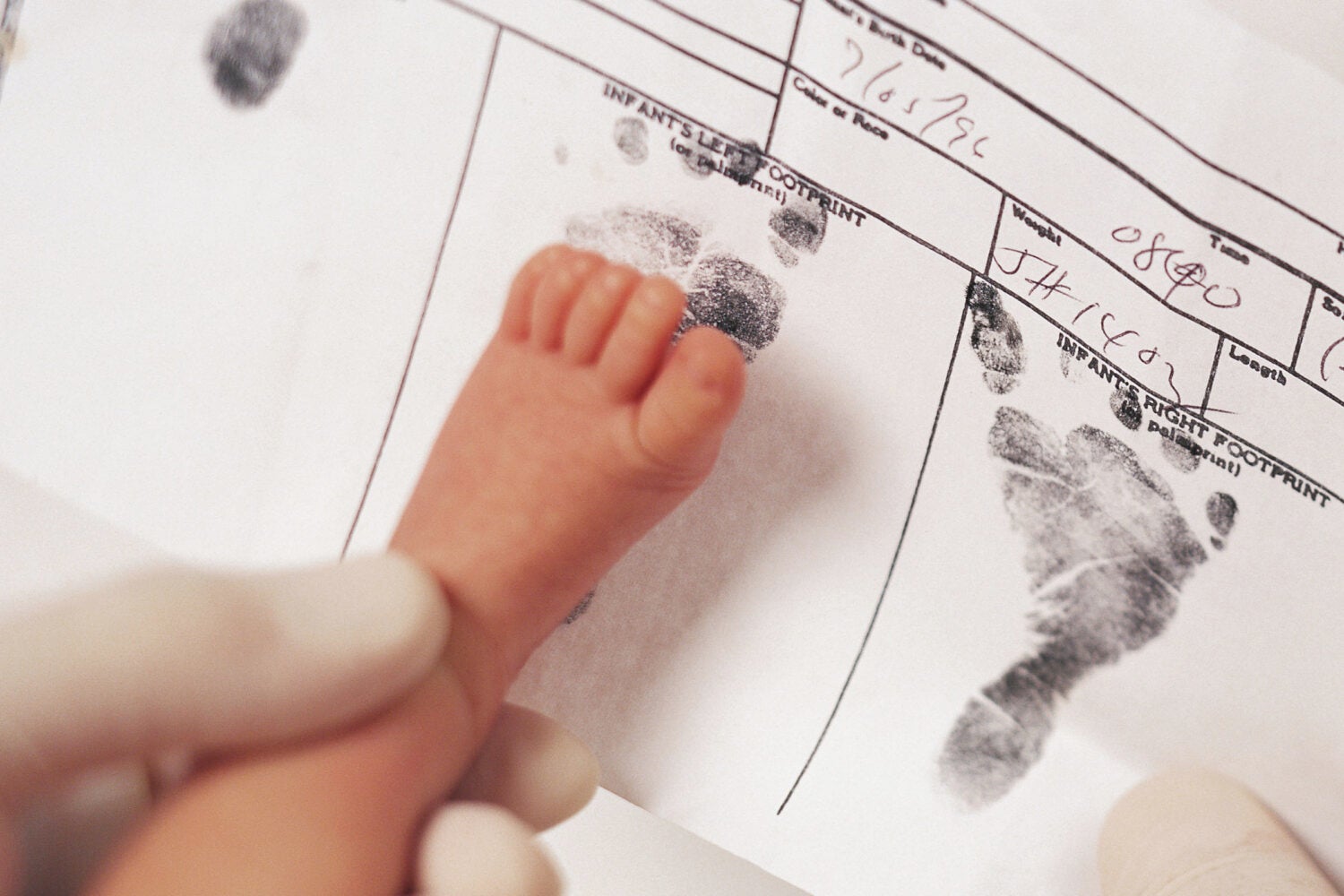The Constitution is clear: Those born on American soil, even to undocumented parents, are citizens of the United States, says Gerald Neuman ’80, the J. Sinclair Armstrong Professor of International, Foreign, and Comparative Law at Harvard Law School.
Almost immediately after Donald Trump was sworn in on January 20, the second-term president issued a series of executive orders, including one touching on birthright citizenship — a constitutional provision that guarantees that those born within the boundaries of the United States automatically attain American citizenship. But according to the president’s directive, the Fourteenth Amendment’s protections should not extend to the children of unauthorized immigrants or those in the country on a temporary visa.
Neuman, an expert in immigration and nationality law, says that both history and Supreme Court precedent confirm an intent to grant citizenship to anyone born in the U.S. — regardless of their parents’ legal status. Moreover, he adds, “The president of the United States has no authority to change citizenship rules at all.”
In an interview with Harvard Law Today on the same day that a federal judge temporarily blocked the order, Neuman explained what birthright citizenship is, how it prevents a “hereditary caste of people who are not citizens,” and why he believes the executive order is “doubly unlawful.”

Harvard Law Today: What is birthright citizenship?
Gerald Neuman: The phrase “birthright citizenship” is used in the U.S. context to refer to citizenship by virtue of where you’re born, rather than by who your parents are, and that citizenship is determined at birth. We also have laws on inheriting citizenship from your parents if you’re born outside the country, and that could also be called birthright citizenship. But generally, we’re talking about birth inside the territory, which in Latin is called jus soli.
HLT: Where does it show up in the Constitution, and why was it added?
Neuman: The concept of jus soli was quite common in the countries of early modern Europe. It was the rule in Great Britain when it colonized North America, and our first states adopted that rule as well. But they didn’t apply it to everyone. People who were born enslaved were not considered citizens, and in many cases, states that allowed slavery also would not extend citizenship to free people of African descent.
There were different rules for each state, because the 1787 Constitution doesn’t say who was a citizen by birth. Then, we get the 1857 Dred Scott decision, in which the majority of the Supreme Court held that regardless of what the northern states said, no person of African descent could be a citizen of the United States within the meaning of the federal Constitution. That was part of a nationalization of slavery, and one of the important causes of the Civil War.
After the Civil War, with slavery abolished, there were now formerly enslaved people and free Black residents who had never been enslaved but hadn’t been considered citizens in their states or by the Supreme Court. To protect them and their children and descendants, Congress passed the Civil Rights Act in 1866 and then put the rule in the Constitution, in the 14th Amendment, that everyone who was born in the United States and subject to the jurisdiction of the United States is a citizen of the United States.
By the time this entered the debates in the 1860s, this was an issue not only with regard to Black people, but also with regard to the Chinese who had started coming to the west coast. It was explicitly discussed whether the rule would include the Chinese, and it was clearly decided that, yes, it would apply to people of any race. Then, the Supreme Court confirmed that in 1898 in the case of United States v. Wong Kim Ark.
HLT: The relevant portion of Fourteenth Amendment states: “All persons born or naturalized in the United States, and subject to the jurisdiction thereof, are citizens of the United States and of the State wherein they reside.” The new administration argues that the phrase “and subject to the jurisdiction thereof” does not apply to children of those who are undocumented or who are on temporary visas. What do you make of that claim?
Neuman: The argument is either a crazy theory or dishonest interpretation of the Constitution. The Supreme Court explained what those words mean in the Wong Kim Ark case. It reflects the fact that there are these traditional exceptions that really do involve people who are not subject to the nation’s jurisdiction. The leading example in the 1860s debates was foreign diplomats, who have diplomatic immunity, who are for the most part not subject to our laws, and who retain the citizenship of the country that sent them and which they are serving. Their children share the immunity and would not qualify. There is also the example of a foreign warship visiting a port of the United States — the country does not exercise jurisdiction over foreign warships, and therefore children born on the foreign warships are not citizens of the United States.
With respect to undocumented workers, they are people who come to the United States to work, to participate in our economy, to live in our society, to live safely in our territory. They are subject to the jurisdiction of the United States. Further, the thing that makes the immigration laws so enforceable against them is that they are subject to the jurisdiction of the United States.
HLT: What are the benefits of awarding citizenship in this way?
Neuman: First, it’s a rule of non-racial citizenship. It doesn’t matter who your parents are — being born in the United States makes you an American citizen. Importantly, it avoids the creation of a hereditary caste of people who are not citizens and whose children will not be citizens and whose children’s children will not be citizens, and are therefore vulnerable to exploitation. That is the main purpose of the Citizenship Clause of the Fourteenth Amendment.
It also serves to integrate the first generation born here very quickly into American society. It helps make American society more cohesive. And there’s another benefit that isn’t much perceived, which is it makes it really easy for citizens to prove they are citizens. If you’ve got a birth certificate showing you were born in the United States, that’s how you prove your citizenship.
HLT: Are there any drawbacks to this type of birthright citizenship?
Neuman: One disadvantage is that it could be overbroad in providing protection to some who will turn out not to need it. In other words, not everybody who’s born in the United States spends the rest of their life in the United States. But they have the option to give up their citizenship.
And then there are some people who really do exploit the rule. There are small numbers of people who come to the U.S. specifically for the purpose of giving birth so that their children get U.S. citizenship and then leave. This is sometimes called birth tourism, and there have been rules made against it in recent years. There are ways of punishing those who are responsible for this rather than visiting the consequences on the babies who haven’t done anything.
“By trying to do this by executive order, it’s a violation of citizenship statutes as well — not just the Constitution. It’s doubly unlawful.”
HLT: Can birthright citizenship be changed or altered unilaterally by the president?
Neuman: Absolutely not. The president has no authority to change the citizenship rule at all. Congress can change the rule, but only to the extent of making it broader. Neither Congress nor the president can reduce it below the constitutional minimum.
HLT: As of now, 22 states have filed lawsuits to challenge President Trump’s executive order. What is likely to happen next?
Neuman: I first want to mention that, by trying to do this by executive order, it’s a violation of citizenship statutes as well — not just the Constitution. It’s doubly unlawful. There are multiple cases out there now. In some of them, the judges may go directly to the Constitution and use the Constitution as the basis of the decision. Some of the judges may go to the statute and use that as the basis of the decision.
Before the cases are decided, there are going to have to be some procedural rulings. Does the person who is suing have standing to sue? Is it too soon to sue? This rule isn’t in effect until February 19. But I would say the merits are clear. There’s only one reasonable answer to this. On that topic, I want to mention that in 1995, the head of the Office of Legal Counsel, Walter Dellinger, was testifying before Congress about this very question, whether it could change the rule. He said that his office grappled with many difficult and close questions of constitutional law, but that this wasn’t one – the bill would be unquestionably unconstitutional. I was very struck with his phrasing. It shouldn’t be a hard issue.
This interview was edited for length and clarity.
Want to stay up to date with Harvard Law Today? Sign up for our weekly newsletter.
